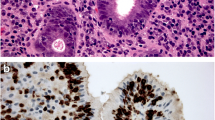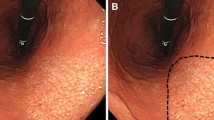Abstract
The dynamics of gastritis remain a topic of intense investigation. The results of these investigations have increased our knowledge concerning the development of preneoplastic lesions and cancer of the stomach and given us insight with regard to the interactions among bacterial colonization, chronic inflammation, and carcinogenesis in other organs. The past year has presented us with further data showing that the progression of chronic gastritis to gland loss and gastric cancer is related to the severity of inflammation, which is influenced by the characteristics of the bacterial strain, host genetics, and hypochlorhydria. In contrast, Helicobacter pylori eradication leads to a rapid disappearance of neutrophils in the gastric mucosa. Chronic inflammation with mononuclear cells also improves upon eradication, but at a much slower rate, usually not leading to normalization within the first year after therapy. Whether H. pylori eradication can thus prevent new development of atrophy and metaplasia as well, or lead to regression of pre-existing lesions, has been the topic of many studies by now. Unfortunately, most of these studies have suffered from their case design, limited sample size, and short follow-up. Therefore, the conflict in outcome of these case studies comes as no surprise. The few prospective, randomized, controlled studies, however, strongly confirm that H. pylori eradication leads to healing of gastritis, which can at least halt further development of atrophy and metaplasia. Whether these lesions can truly regress remains to be proven.
Similar content being viewed by others
References and Recommended Reading
Ihamäki T, Saukkonen M, Siurala M: Long-term observation of subjects with normal mucosa and with superficial gastritis: results of 23–27 years‘ follow up examinations. Scand J Gastroenterol 1978, 13:771–775.
Mackay IR, Hishop IG: Chronic gastritis and gastric ulcer. Gut 1966, 7:228–33.
Roland M, Berstad A, Liavåg I: A histological study of gastric mucosa before and after proximal gastric vagotomy in duodenal ulcer patients. Scand J Gastroenterol 1975, 10:181–186.
Whitehead R, Truelove SC, Gear MWL: The histological diagnosis of chronic gastritis in fibreoptic gastroscope biopsy specimens. J Clin Pathol 1972, 25:1–11.
Correa P, Haenszel W, Cuello C, et al.: A model for gastric cancer epidemiology. Lancet 1975, 2:58–59.
Kuipers EJ, Uyterlinde AM, Pena AS, et al.: Long term sequelae of Helicobacter pylori gastritis. Lancet 1995, 345:1525–1528.
International Agency for Research on Cancer: Schistosomes, liver flukes and Helicobacter pylori. In IARC Monographs on the Evaluation of Carcinogenic Risks to Humans, vol 61. Lyon: IARC; 1994.
McFarlane GA, Wyatt J, Forman D, Lachlan GW: Trends over time in H. pylori-gastritis in Kenya. Eur J Gastroenterol Hepatol 2000, 12:617–621. First cohort study from Africa regarding the dynamics of H. pylori gastritis, reporting a similar progression to atrophic gastritis as in.
Ally R, Hale M, Morton D, et al.: Helicobacter pylori in Soweto, South Africa: cagA status and histopathology in children [abstract]. Gastroenterology 1998, 114:A54.
Namekata T, Miki K, Kimmey M, et al.: Chronic atrophic gastritis and Helicobacter pylori infection among Japanese Americans in Seattle. Am J Epidemiol 2000, 151:820–830.
El-Omar E, Oien K, Murray L, et al.: Increased prevalence of precancerous changes in relatives of gastric cancer patients: critical role of H. pylori. Gastroenterology 2000, 118:22–30. These authors report that first-degree relatives of patients with gastric cancer have similar prevalence of H. pylori as do control subjects, but higher prevalence of atrophic gastritis and hypochlorhydria, suggesting a genetic predisposition. Some regression of atrophy was seen after H. pylori eradication.
BrennerH, Bode G, Boeing H: Helicobacter pylori among offspring of patients with stomach cancer. Gastroenterology 2000, 118:31–35. This report indicates that first-degree relatives of patients with gastric cancer have a higher prevalence of H. pylori than do control subjects, suggesting that familial gastric cancer predisposition may also be due to intrafamilial spreading of specific strains.
El-Omar EM, Carrington M, Chow WH, et al.: Interleukin-1 polymorphisms associated with increased risk of gastric cancer. Nature 2000, 404:398–402. This report indicates that the prevalence of proinflammatory genotypes of the IL-1β gene are more common among gastric cancer patients than control subjects. It gives the first description of a specific link between host genetics and outcome of H. pylori colonization.
Klinkenberg-Knol EC, Nelis F, Dent J, et al.: Long-term omeprazole treatment in resistant gastroesophageal reflux disease: efficacy, safety and influence on gastric mucosa. Gastroenterology 2000, 118:661–669. The authors describe what is until now the largest follow-up cohort of GERD patients on PPI maintenance therapy. Progression to atrophic gastritis was confined to H. pylori-positive patients and occurred at a similar rate as in previous PPI cohort studies.
Kuipers EJ, Meuwissen SGM: The efficacy and safety of longterm omeprazole treatment for gastroesophageal reflux disease. Gastroenterology 2000, 118:795–801.
Genta RM: Recognizing atrophy: another step toward a classification of gastritis. Am J Surg Pathol 1996, 20(suppl 1):S23-S30.
van Grieken NCT, Weiss MM, Meijer GA, et al.: Rapid quantitative assessment of gastric corpus atrophy in tissue sections. J Clin Pathol 2001, 54:63–69.
Blaser MJ, Pérez-Pérez GI, Kleanthous H, et al.: Infection with Helicobacter pylori strains possessing cagA is associated with an increased risk of developing adenocarcinoma of the stomach. Cancer Res 1995, 55:2111–2115.
Oksanen A, Sipponen P, Karttunen R, et al.: Atrophic gastritis and Helicobacter pylori infection in outpatients referred for gastroscopy. Gut 2000, 46:460–463.
Ley C, Mohar A, Guarner J, et al.: Screening markers for chronic atrophic gastritis in Chiapas, Mexico. Cancer Epidemiol Biomarkers Prev 2001, 10:107–112.
Carratu R, Iuliano D, Iovene MR, et al.: Peptic ulcer occurrence in follow-up of chronic gastritis in patients with treated and not eradicated CagA-positive Helicobacter pylori infection. Dig Dis Sci 2001, 46:581–586.
Queiroz DM, Mendez EN, Carvalho AS, et al.: Factors associated with Helicobacter pylori infection by a cagApositive strain in children. J Infect Dis 2000, 181:626–630.
Odenbreit S, Puls J, Sedlmaier B, et al.: Translocation of Helicobacter pylori CagA into gastric epithelial cells by type IV secretion. Science 2000, 287:1497–1500. This report documents that cagA-positive H. pylori strains can translocate the cagA protein into gastric epithelial cells, thus inducing changes in the tyrosine phosphorylation state of host cellular proteins.
Miehlke S, Yu J, Schuppler M, et al.: Helicobacter pylori vacA, iceA, and cagA status and pattern of gastritis in patients with malignant and benign gastroduodenal disease. Am J Gastroenterol 2001, 96:1008–1113.
Occhialini A, Marais A, Urdaci M, et al.: Composition and gene expression of the cag pathogenicity island in Helicobacter pylori strains isolated from gastric carcinoma and gastritis patients in Costa Rica. Infect Immun 2001, 69:1902–1908.
Uemura N, Mukai T, Okamoto S, et al.: Effect of Helicobacter pylori eradication on subsequent development of cancer after endoscopic resection of early gastric cancer. Cancer Epidemiol Biomark Prev 1997, 6:639–642.
Parsonnet J, Harris RA, Hack HM, Owens DK: Modelling cost-effectiveness of Helicobacter pylori screening to prevent gastric cancer: a mandate for clinical trials. Lancet 1996, 348:150–154.
Larkin CJ, Watson P, Sloan JM, et al.: Gastric corpus atrophy following eradication of Helicobacter pylori. Eur J Gastroenterol Hepatol 2001, 13:377–382.
Schenk BE, Kuipers EJ, Klinkenberg-Knol EC, et al.: Hypergastrinemia during long-term omeprazole therapy: influences of vagal nerve function, gastric emptying and Helicobacter pylori infection. Aliment Pharmacol Ther 1998, 12:605–612.
Zerbib F, Lenk C, Sawan B, et al.: Long-term effects of Helicobacter pylori eradication on gastric antral mucosa in duodenal ulcer patients. Eur J Gastroenterol Hepatol 2001, 12:719–725.
Annibale B, Aprile MR, D‘Ambra G, et al.: Cure of Helicobacter pylori infection in atrophic body gastritis patients does not improve mucosal antrophy but reduces hypergastrinemia and its related effects on body ECL-cell hyperplasia. Aliment Pharmacol Ther 2000, 14:625–634.
Morales TG, Sampliner RE, Camargo E, et al.: Inability to noninvasively diagnose gastric intestinal metaplasia in Hispanics or reverse the lesion with Helicobacter pylori eradication. J Clin Gastroenterol 2001, 32:400–404.
Ohkusa T, Fujiki K, Takashimizu I, et al.: Improvement in atrophic gastritis and intestinal metaplasia in patients in whom Helicobacter pylori was eradicated. Ann Intern Med 2001, 134:380–386.
Logan RPH, Walker MM, Misiewicz JJ, et al.: Changes in the intragastric distribution of Helicobacter pylori during treatment with omeprazole. Gut 1995, 36:12–16.
Kuipers EJ, Uyterlinde AM, Pena AS, et al.: Increase of Helicobacter pylori associated corpus gastritis during acid suppressive therapy: implications for long-term safety. Am J Gastroenterol 1995, 90:1401–1406.
van der Hulst RWM, van der Ende A, Dekker FW, et al.: Effect Helicobacter pylori eradication on gastritis in relation to cagA: a prospective 1-year follow-up study. Gastroenterology 1997, 113:25–30.
Satoh K, Kimura K, Takimoto T, Kihira K: A follow-up study atrophic gastritis and intestinal metaplasia after eradication of Helicobacter pylori. Helicobacter 1998, 3:236–240.
Savarino V, Mela GS, Zentilin P, et al.: Histological and functional recovery in patients with multifocal atrophic gastritis after eradication of Helicobacter pylori infection. Ital J Gastroenterol Hepatol 1999, 31:4–8.
Oberhuber G, Wuendisch T, Rappel S, Stolte M: Significant improvement of atrophy after eradication therapy in atrophic body gastritis. Pathol Res Pract 1998, 194:609–613.
Tucci A, Poli L, Tosetti C, et al.: Reversal of fundic atrophy after eradication of Helicobacter pylori. Am J Gastroenterol 1998, 93:1425–1431.
Stolte M, Meining A, Koop H, Seifert E: Eradication of Helicobacter pylori heals atrophic corpus gastritis caused by long-term treatment with omeprazole. Virchows Arch 1999, 434:91–94.
Sung JJ, Lin SR, Ching JY, et al.: Atrophy and intestinal metaplasia one year after cure of H. pylori infection: a prospective, randomized study. Gastroenterology 2000, 119:7–14. This report describes a prospective randomized 1-year follow-up study of the effect of H. pylori eradication on the dynamics of gastritis in volunteers. Inflammation and atrophy progressed in H. pyloripositive patients. H. pylori eradication led to regression of inflammation but not of atrophy.
Genta RM: A year in the life of the gastric mucosa. Gastroenterology 2000, 119:252–254.
Schenk BE, Kuipers EJ, Nelis GF, et al.: Effect of Helicobacter pylori eradication on chronic gastritis during omeprazole therapy. Gut 2000, 46:615–621. This report describes a prospective randomized 1-year follow-up study of the effect of H. pylori eradication on the dynamics of gastritis in GERD patients taking omeprazole. Inflammation progressed in H. pylori-positive patients, whereas H. pylori eradication led to regression of inflammation.
Kuipers EJ, Nelis GF, Klinkenberg-Knol EC, et al.: Helicobacter pylori eradication for the prevention of atrophic gastritis during omeprazole therapy: a prospective randomized trial [abstract]. Gastroenterology 2001, 120(suppl 1):A-14.
Author information
Authors and Affiliations
Rights and permissions
About this article
Cite this article
Kuipers, E.J., Grool, T.A. The dynamics of gastritis. Curr Gastroenterol Rep 3, 509–515 (2001). https://doi.org/10.1007/s11894-001-0072-x
Issue Date:
DOI: https://doi.org/10.1007/s11894-001-0072-x




